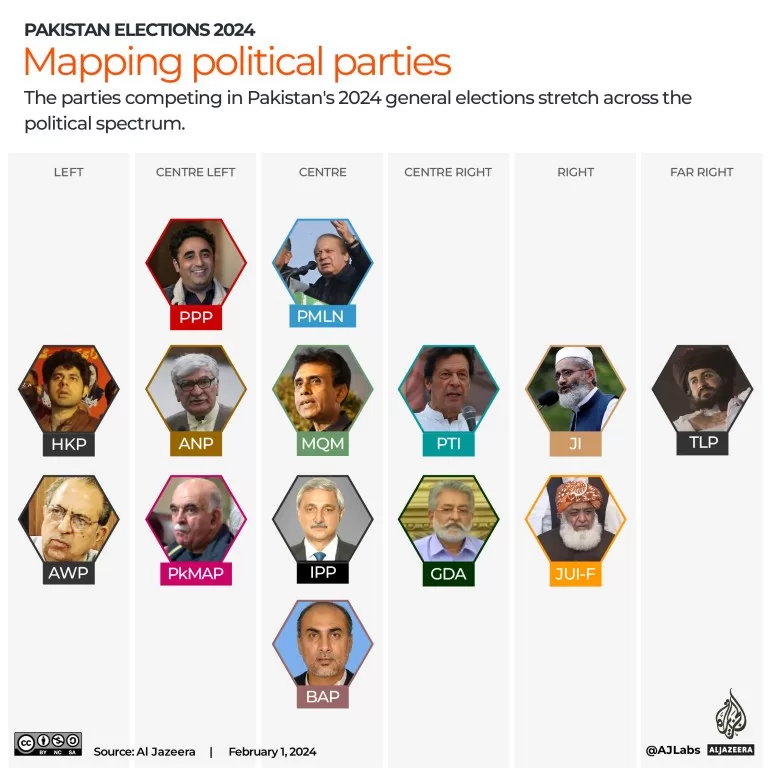The vote comes amid a crackdown on former Prime Minister Imran Khan’s party, the Pakistan Tehreek-e-Insaf (PTI), and a fluid political climate.
Like most major democracies, Pakistan’s political parties span a spectrum of ideologies.
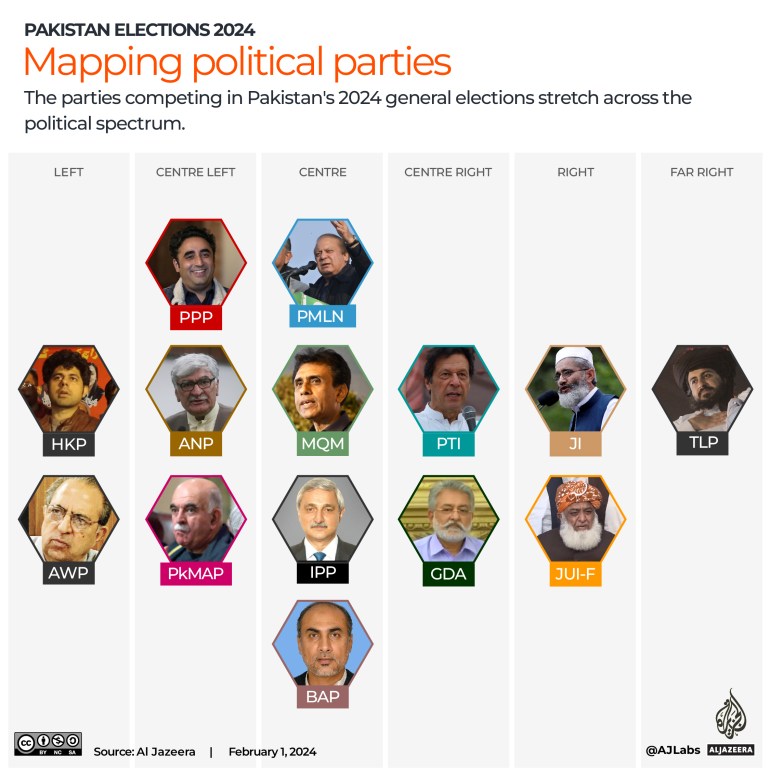
Here are the country’s major parties — including those that have been in power nationally, others that have significant regional or local influence and still others that are smaller yet reflect the diverse issues and challenges that Pakistan confronts.
Pakistan Muslim League-Nawaz (PMLN)
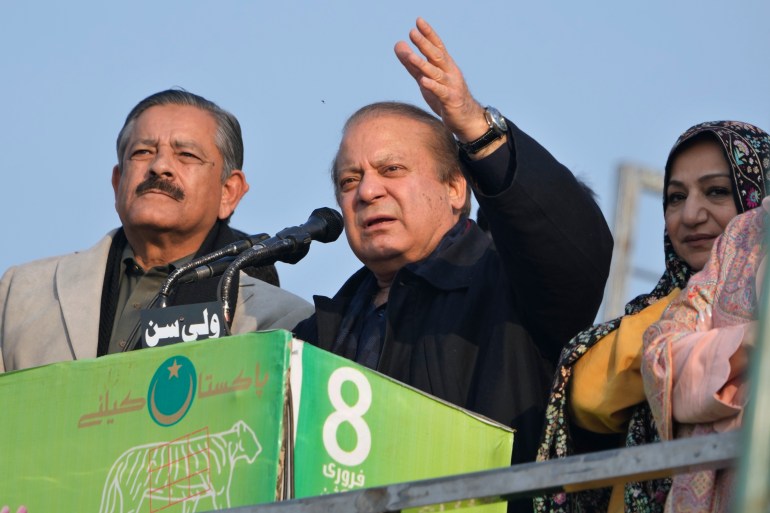
The Pakistan Muslim League-Nawaz, a centrist party led by former Prime Minister Nawaz Sharif, came to power for the third time in 2013 with a clear majority.
But Sharif, 74, was removed from office in 2017, unable to complete his term in office due to an array of corruption charges against him. Along with his daughter, Maryam, he was sentenced to jail for 10 years in 2018, days before the last national election.
Shehbaz Sharif, 72, Nawaz’s younger brother and former chief minister of the party’s political stronghold, Punjab, took office as prime minister in 2022. That was after the PMLN, as part of an alliance known as the Pakistan Democratic Movement (PDM), toppled Khan and his government in a vote of no-confidence. Khan had come to power in 2018.
Shehbaz’s supporters often call him “Shehbaz speed” for his energy and fast delivery style on infrastructure projects, such as Lahore’s Metro Bus project.
However, his 16 months as prime minister saw hyperinflation and protests led by Khan’s PTI.
Meanwhile, Nawaz returned to Pakistan in October from four years of self-imposed exile in the United Kingdom. Within weeks, corruption charges against him were overruled in the courts, leading to suggestions from analysts that he had been handpicked by the powerful military as the nation’s next prime minister.
The biggest challenge before the Sharifs will be to wrestle back their support base from Khan, who despite being in jail under multiple sentences, remains a popular force, especially among urban youth with a strong digital presence.
The PMLN is still the clear frontrunner heading into the elections. While the elder Sharif is the party’s supremo, it’s unclear which of the brothers may lead the National Assembly if the PMLN secures enough seats.
Seats won in 2018: 64
Seats won in 2013: 126
PTI affiliates
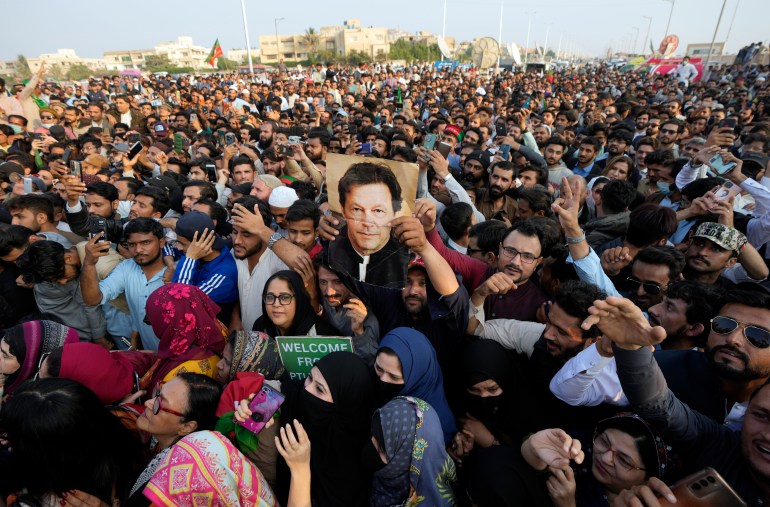
The PTI, founded by cricketer-turned-politician Khan and currently led by Gohar Ali Khan, leans more to the centre right.
Khan came to power with a victory in the 2018 elections. But within years, the military establishment, which appeared to have backed him in that vote, turned against him as Khan was deposed from office by a no-confidence vote in parliament, the first in Pakistan’s history.
Khan accuses the United States of conspiring with Pakistan’s military and his political rivals to throw him out, a charge they all deny. After his dismissal, Khan’s party led demonstrations across the country, demanding early elections.
However, the protests took an ugly turn when Khan was arrested in May on charges of corruption. His supporters went on a rampage, targeting civilian and military installations.
The unrest resulted in a brutal retaliation from the state. Hundreds of party leaders were forced to quit the PTI, thousands of its workers were arrested, and the party faced suppression.
Khan, who has more than 150 cases filed against him, has now been convicted of corruption as well as disclosing state secrets and faces 14 years in jail.
His party was stripped of its electoral symbol, the cricket bat, and its candidates are now forced to run as independents.
Despite the obvious hurdles in its way, the PTI enjoys vast popular support across the country, which could work to its advantage.
Seats won in 2018: 116
Seats won in 2013: 28
Pakistan People’s Party (PPP)
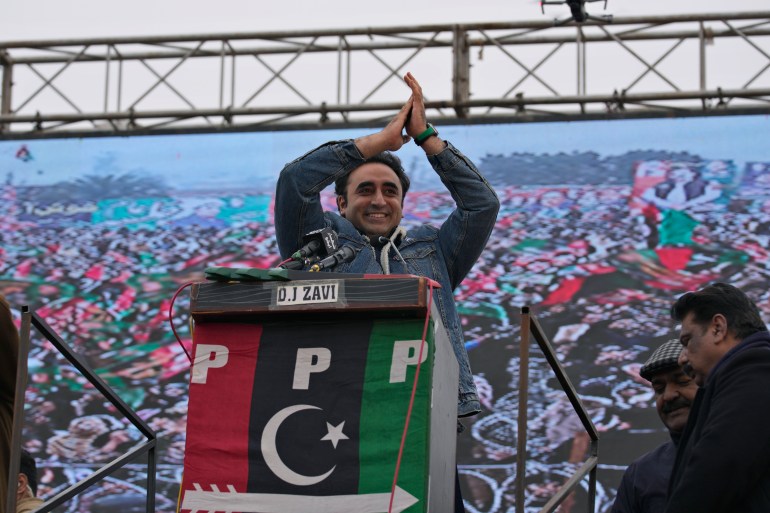
The centre-left Pakistan People’s Party (PPP), led by Bilawal Bhutto Zardari and his father, Asif Ali Zardari, is striving to return to power for the first time since 2008.
The party was founded by his maternal grandfather and former Prime Minister Zulfikar Ali Bhutto, then led by his mother, two-time Prime Minister Benazir Bhutto. The 35-year-old Bhutto Zardari has big boots to fill.
The scion of the Bhutto dynasty will be competing in his second election. He was foreign minister under PDM rule after Khan’s ouster in 2022.
Bhutto Zardari stands out as a young leader in an even younger nation — the median age is 20 in a country otherwise dominated by men in their 70s.
But he faces challenges, including criticism of his party’s governance of Sindh for the past four terms, especially after cataclysmic 2022 flooding, which destroyed much of the province.
His manifesto and campaign are focused on connecting with the youth of the country, and he has ambitious plans to combat climate change.
If he does become prime minister in a significant upset, he would be following in the footsteps of his mother, who first took the country’s top executive office in 1988 at the same age.
Seats won in 2018: 43
Seats won in 2013: 34
Awami National Party (ANP)
The Awami National Party, an ethnic Pashtun nationalist party based mainly in the northwestern province of Khyber Pakhtunkhwa, seeks to replace the PTI in the provincial government there.
The centre-left party, led by Asfandyar Wali Khan, takes progressive, secular positions on policy but has been dogged by corruption allegations and has been out of power for nearly two decades.
The ANP was part of the 11-party PDM alliance.
Seats won in 2018: 1
Seats won in 2013: 2
Muttahida Qaumi Movement Pakistan (MQM-P)
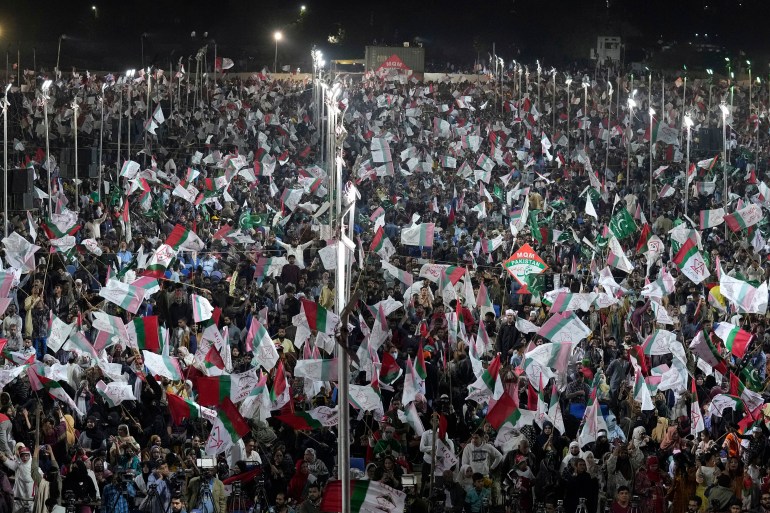
The Muttahida Qaumi Movement was the most powerful political force in Karachi, Pakistan’s largest city and economic backbone, for nearly three decades.
In the past, the MQM-P has always formed alliances with the parties leading the country nationally. It was in coalition with the PTI after the 2018 elections but switched loyalties over to the PDM after April 2022.
The MQM-P split in August 2016 into a London faction and a Pakistan faction after an incendiary speech by its exiled leader Altaf Hussain.
Yet when the chance to join the PDM alliance arose, the split factions and offshoots of the MQM-P reunited.
Past paramilitary operations targeting the party and its alleged connections to criminal enterprises in Karachi have broken its popularity Sindh province.
Most of its support is in Karachi and neighbouring cities, which have large pockets of people who fled there after the subcontinent’s partition in 1947.
The MQM-P will battle PTI-affiliated independents, Jamaat-e-Islami, the PPP and young independent candidates to try and regain their base.
Seats won in 2018: 6
Seats won in 2013: 18
Jamaat-e-Islami (JI)
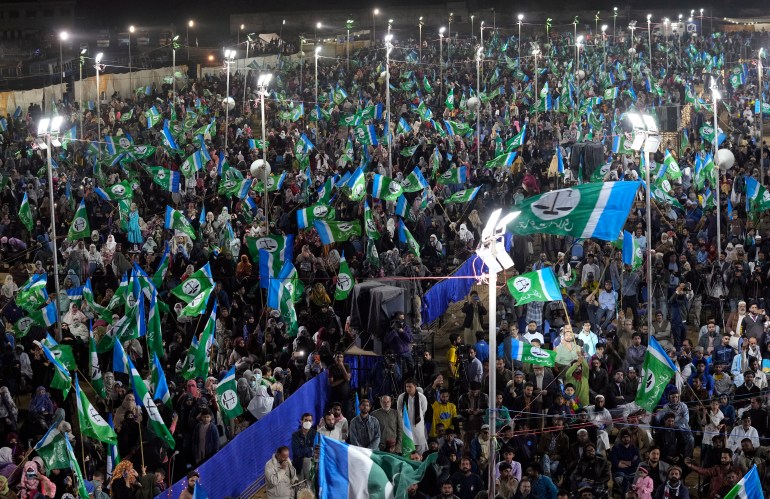
Led by Siraj ul Haq, Jamaat-e-Islami is a right-wing party with its manifesto centred around religion.
One of Pakistan’s oldest political parties is well known for its strong party organisation, but it has failed to do well at the ballot box.
It has been out of power for decades, and its last success of any note was in the 2002 elections under the rule of President Pervez Musharraf, a general who took power in a coup.
The JI is targeting Khyber Pakhtunkhwa and heavily focusing on Karachi with its relatively young leader, Hafiz Naeem.
Having done well in recent local elections in Karachi, the religious party is trying to promote a more moderate, development-centric agenda that it hopes will attract voters.
Seats won in 2018: 12 (in an alliance of religious parties)
Seats won in 2013: 2
Jamiat-e-Ulema Islam (JUI-F)
The right-wing Jumiat-e-Ulema Islam, led by Fazal-ur-Rehman, is also aiming to regain lost ground, particularly in Khyber Pakhtunkhwa province, which it lost to the PTI.
The Muslim leader was head of the PDM alliance and is looking to use his vast network of religious seminaries to help him win votes.
With a wealth of political experience in Pakistan, Rehman is an astute political operator who could also forge alliances when the new government is being formed.
Seats won in 2018: 12 (in an alliance of religious parties)
Seats won in 2013: 11
Pakhtunkhwa Milli Awami Party (PkMAP)
The Pakhtunkhwa Milli Awami Party is a Pashtun nationalist group, mainly active in Balochistan province, where it was part of the ruling alliance in the last provincial government.
Led by Mahmood Khan Achakzai, PkMap is considered a progressive centre-left party in Pakistan’s most impoverished province, which also has the least number of national assembly seats (16).
The party seeks greater provincial autonomy and enhanced powers for the Senate, where all the provinces have equal representation.
Seats won in 2018: 0
Seats won in 2013: 3
Balochistan Awami Party (BAP)
The Balochistan Awami Party was formed in 2018 with current interim Prime Minister Anwaar-ul-Haq one of its founders.
The party, since its inception, was seen as a group of disparate politicians belonging to various tribes of Balochistan, towing the line of Pakistan’s powerful military establishment. In the 2018 elections, the BAP formed an alliance with the PTI.
The party will contest at least 10 National Assembly seats, all from Balochistan, and is expected to be a powerbroker if major parties need partners to form a coalition government.
Seats won in 2018: 4
Seats won in 2013: n/a
Awami Workers Party (AWP)
The left-wing Awami Workers Party is a relatively newer and smaller movement in comparison to the other mainstream groups. It is campaigning on an anti-austerity plank.
While it provides an option to voters disillusioned with the existing political system in the country, it has just three candidates contesting National Assembly seats across the country, which limits its impact.
Seats won in 2018: 0
Seats won in 2013: 0
Haqooq-e-Khalq Party (HKP)
A new entrant in the 2024 polls, the socialist Haqooq-e-Khalq Party is fielding young candidates in PMLN strongholds in Lahore.
Similar to the AWP, the HKP struggles with financial resources to put up candidates in more constituencies and will be contesting from one city only with two National Assembly candidates and one provincial candidate.
Seats won in 2018: n/a
Seats won in 2013: n/a
Istehkam-e-Pakistan Party (IPP)
Formed in June, the Istehkam-e-Pakistan Party was founded by Jehangir Tareen, one of the richest businessmen in Pakistan and a close confidante and financier of Khan in the past.
The centrist party came into being just a month after Khan’s PTI faced a state crackdown in the aftermath of the May 9 unrest.
A large number of PTI leaders, who announced their resignations from the party, soon emerged from the shadows and announced they were joining the IPP.
The party is seen as being made up of a large number of electable candidates with strong personal influence in their native areas. It hopes to win enough seats in the elections to play a part in the formation of the next government.
Seats won in 2018: n/a
Seats won in 2013: n/a
Independents
While the candidates remaining in the PTI have to run as independents due to legal woes afflicting the party, these polls will also see a large number of independents who are not linked to any party.
Some of those contestants have been part of the PTI in the past, but this time are choosing to participate on their own. Others are young independent candidates without mainstream political affiliations.
Historically, independent candidates have almost always ended up joining the party with the largest number of seats in the National Assembly.
Seats won in 2018: 13
Seats won in 2013: 27
